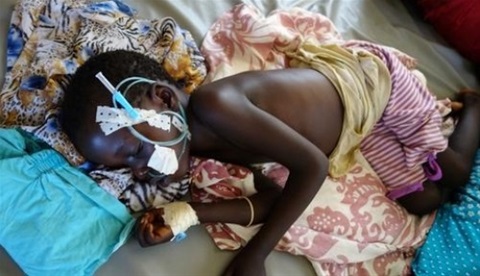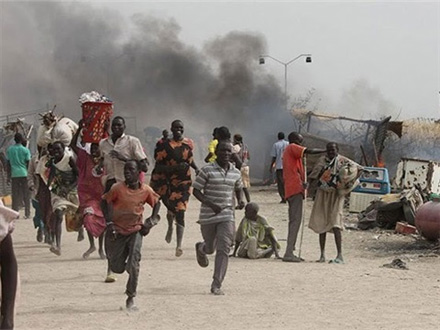The IDPs in Aburoc camp are dying of diseases, due to lack of medicine in the camp, the conditions IDPs in an ad hoc camp in Aburoc village it has been wracked by dire shortages of medicine and cases of cholera.

South Sudan: 'Shocking' killing and mass displacement of Shilluk people by government forces - new evidence 21 Jun 2017, 11:02am
Amnesty International can reveal the “shocking” horrors faced by tens of thousands of civilians in South Sudan’s Upper Nile region as they were forcibly displaced by government forces between January and May this year, in new findings published today
Amnesty researchers interviewed victims and eyewitnesses who described how government troops and allied militias burnt, shelled and systematically looted civilian houses. Witnesses reported how a bombing from an Antonov plane destroyed civilian homes, and revealed how some elderly or vulnerable people who were unable to flee the violence burnt to death in their homes.
The organisations also documented how government troops killed several civilians over the course of the offensive. Some of the killings were clearly deliberate, as the victims were shot while held captive or shot in the back while they attempted to flee.
Civilians from the Shilluk minority told Amnesty how everything from stored food supplies to furniture and even the front doors of houses were stolen during the purge. One village chief described the destruction as though the area had been “swept by a flood”.
Joanne Mariner, Senior Crisis Response Adviser at Amnesty International, said: “The mass displacement of the Shilluk ethnic minority, almost in its entirety, is truly shocking. “Whole areas of the Shilluk heartland have been ravaged, with civilians’ homes burnt and their belongings and food stores looted. This leaves them with little prospect of returning home, given the region’s growing humanitarian crisis and their fears of renewed violence.”
The January-May 2017 government offensive in Upper Nile, aided by ethnic Dinka militias, retook territory that had in recent years been under the control of an opposition armed group made up of Shilluk Agwelek fighters under the command of Johnson Olony. It displaced tens of thousands of Shilluk civilians, including nearly the entire populations of numerous towns and villages on the west bank of the White Nile.
Amnesty has gathered satellite imagery showing the destruction of homes and other civilian objects in the central areas of Wau Shilluk – including a traditional temple or Radd. Most people in the region live in thatch-roofed huts called tukuls, which are highly flammable.
Some of the Shilluk have returned to their homes since the offensive, but the large majority remain displaced. Tens of thousands have fled north to become refugees in Sudan, and approximately 10,000 others are surviving in squalid conditions in an ad hoc camp in Aburoc village that has been wracked by dire shortages and cases of cholera.
Located in a pocket controlled by the Agwelek opposition forces, who are aligned with the Sudan People’s Liberation Movement-in Opposition (SPLA-IO), Aburoc is patrolled by a small contingent of UN peacekeeping troops sent there to facilitate the delivery of humanitarian aid. The camp is ill-suited to be a long-term refuge for large numbers of displaced persons as it lacks sufficient water for their basic needs Donatella Rovera, Senior Crisis Response Adviser at Amnesty International, said:
“Bereft of food and belongings, Shilluk civilians will need humanitarian aid to return home. But most of all, UN peacekeepers must be prepared and adequately resourced to ensure that their security will be protected
In late May and early June, Amnesty International researchers interviewed 79 victims and eyewitnesses to abuses at an ad hoc displaced persons camp in Aburoc, and in the UN Protection of Civilians (PoC) site in Malakal, both in the Upper Nile region. They also spoke to numerous humanitarian staff, UN officials, and opposition, political and civil society figures in Aburoc, Malakal and Juba.
Sudan takes new measures to control South Sudanese refugee camps after riots
August 4, 2017 (KHARTOUM) - Sudan’s Ministry of Interior on Thursday decided to take new measures in South Sudanese refugee camps in the White Nile State following recent riots in the southern state.
Violence broke out Tuesday at Khor Al-Waral Camp, the biggest South Sudanese refugee camp in the White Nile State which houses over 53,000 refugees, while there are more than 160,000 refugees in the whole state
The scale and cause of the trouble were not immediately clear, however, pictures posted on social media showed smoke billowing from the camp and burnt huts.
Also, there were reports that four Sudanese teachers have been raped in the incident. Sudan’s State Interior Minister Babekir Digna on Thursday has inspected the camp, saying the law would be applied on all those responsible for the incident.
He told the official news agency SUNA that new measures would be implemented regarding allowing entry to the camp, saying they have informed the chiefs of the camp about the new measures. Digna said the UNHCR’s representative in Sudan, Noriko Yoshida underscored full respect for the laws to protect the public safety, pointing the conditions at the camp are stable and the police and security forces have brought the situation under control.
For her part, Yoshida has denounced the incident, saying she is accompanying the Sudanese officials to address the situation in the camp.
She expressed solidarity with the families of the victims, saying the law must the law must apply to everyone without exception.
The UN official further called on the refugees to renounce violence, urging the residents to maintain security and peace inside the camps.
Meanwhile, the government of the White Nile State Friday said investigations have begun with 78 accused in the Khor Al- Waral incident.
The state governor Abdel-Hamid Musa Kasha stressed the government will bring the perpetrators to justice, saying they deal with the South Sudanese refugee as citizens.
In the same context, the World Health Organization (WHO) representative in Sudan.Naeema Al-Gasseer, have visited the teachers who have been assaulted in the camp incident at the Kosti Hospital.
She called to renounce violence and promote values of tolerance, expressing regret over the violence suffered by a number of teachers.
Al-Gasseer pointed to the UN principles promoting tolerance, saying the assailants would be put to trial following the completion of the investigations conducted by the relevant authorities. According to the UN, more than 410,000 South Sudanese — nearly 90% of them women and children — have fled to Sudan since the outbreak of civil war in 2013.
South Sudan seceded from Sudan on July 9th, 2011 following a referendum on whether the semi-autonomous region should remain a part of the country or become independent. 99% of the Southern Sudanese voters chose Independence.
Source: http://www.sudantribune.com/spip.php?article63164